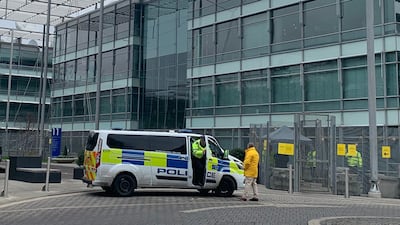Threats by Iran against journalists in Britain require a “significant and robust response from the UK”, a senior opposition MP said on Wednesday.
Shadow security minister Holly Lynch said plots by hostile states such as Iran and Russia were among the “most immediate concerns within the threat landscape” in Britain.
Her appeal came after regime-critical television channel Iran International was forced to leave its London offices because of security issues.
Counter-terrorism police said they had serious concerns for Iran International's journalists despite armed officers patrolling the site.
The channel has relocated to the US, but said it hopes to resume broadcasting from Britain when possible.
Ms Lynch, a Labour MP, said it was an “alarming revelation” that police had foiled 15 Iranian plots against critics of the regime based in Britain.
“We have to ask ourselves what message does that send to the rest of the world, when journalists are not safe here in the UK,” she said in a speech to a counter-terrorism expo in London.
“When we have authoritarian hostile states engaged in exporting tyranny into our country, pursuing those they perceive as enemies, and the heads of our security services are calling it out for the terrorism that it is, it calls for a significant and robust response from the UK.”
Dominic Murphy, commander of Metropolitan Police counter-terrorism unit SO15, told The National his officers were "increasingly close" to UK intelligence agencies as they deal with state threats.
He said police were "operating increasingly in secure bubbles" and unable to share information because of the sensitivity of the threats.
"We really do need to get ahead of the [state] threats, and we have advised private industry, government and others on how we think they should respond," he said.
"Sometimes, Iran International being a good example, we will have to react because for us it's about public safety."
Relations between Tehran and the West have deteriorated since Iran was linked to Russian drone attacks on Ukraine and was accused of brutally suppressing women’s rights protests that erupted last autumn.
Iran has also been accused of taking British and European citizens hostage to use as political bargaining chips.
Ms Lynch urged the government to ban Iran’s Islamic Revolutionary Guard Corps under terrorism laws.
A ban on the IRGC has been held up by concerns from diplomats about the effect on UK citizens should Tehran retaliate.
British-Iranian activist Vahid Beheshti staged a 72-day hunger strike to increase pressure on ministers to ban the IRGC.
Labour has “sought to persuade the government of the merits” of proscribing the IRGC as well as the Kremlin-linked Wagner mercenary group, Ms Lynch said.
A ban “wouldn’t simply be a symbolic measure – which would be powerful in its own right, but that is not what proscription powers should be used for”, she said.
“Proscription would grant law enforcement the powers to take action against those supporting the IRGC and allow for a more effective dismantling of the support base necessary to facilitate such unacceptable conduct here within our borders.”


